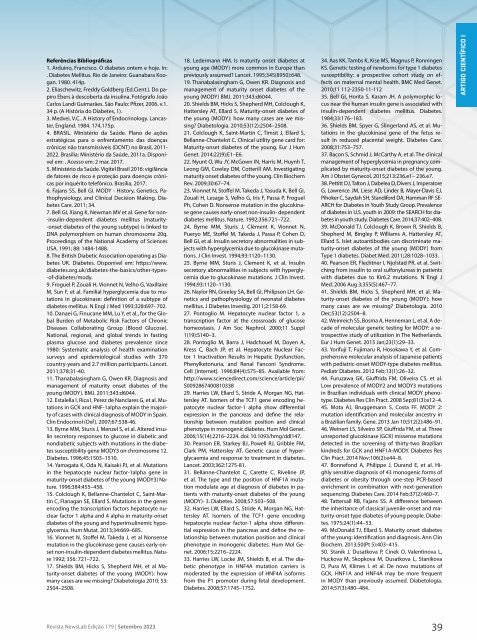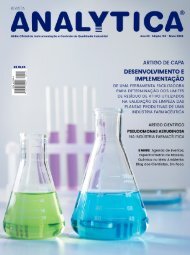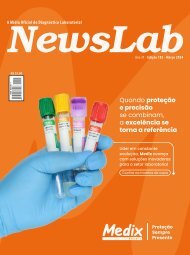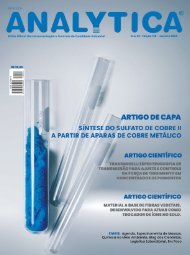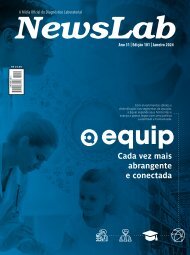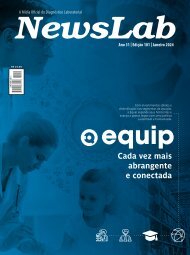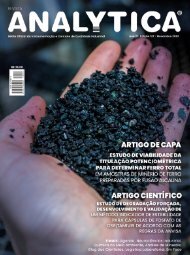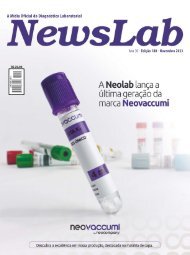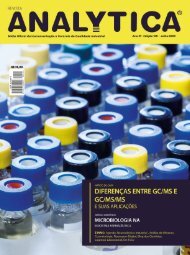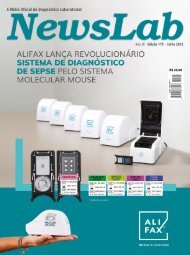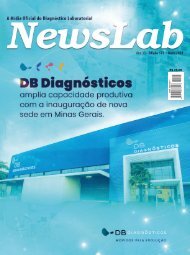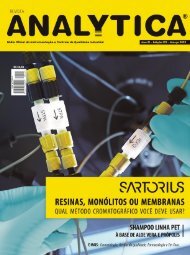Revista Newslab Edição 179
Revista Newslab Edição 179 - Setembro 2023
Revista Newslab Edição 179 - Setembro 2023
You also want an ePaper? Increase the reach of your titles
YUMPU automatically turns print PDFs into web optimized ePapers that Google loves.
Referências Bibliográficas<br />
1. Arduino, Francisco. O diabetes ontem e hoje. In:<br />
. Diabetes Mellitus. Rio de Janeiro: Guanabara Koogan.<br />
1980. 414p.<br />
2. Eliaschewitz, Freddy Goldberg (Ed.Cient.). Do papiro<br />
Ebers à descoberta da insulina. Fotógrafo João<br />
Carlos Landi Guimarães. São Paulo: Pfizer, 2006. v.1.<br />
34 p. (A História do Diabetes, 1).<br />
3. Medvei, V.C.. A History of Endocrinology. Lancaster,<br />
England. 1984. 174,175p.<br />
4. BRASIL. Ministério da Saúde. Plano de ações<br />
estratégicas para o enfrentamento das doenças<br />
crônicas não transmissíveis (DCNT) no Brasil, 2011-<br />
2022. Brasília: Ministério da Saúde, 2011a. Disponível<br />
em: . Acesso em: 2 mar. 2017.<br />
5. Ministério da Saúde. Vigitel Brasil 2016: vigilância<br />
de fatores de risco e proteção para doenças crônicas<br />
por inquérito telefônico. Brasília, 2017.<br />
6. Fajans SS, Bell GI. MODY - History, Genetics, Pathophysiology,<br />
and Clinical Decision Making. Diabetes<br />
Care. 2011; 34.<br />
7. Bell GI, Xiang K, Newman MV et al. Gene for non-<br />
-insulin-dependent diabetes mellitus (maturity-<br />
-onset diabetes of the young subtype) is linked to<br />
DNA polymorphism on human chromosome 20q.<br />
Proceedings of the National Academy of Sciences<br />
USA. 1991; 88: 1484-1488.<br />
8. The British Diabetic Association operating as Diabetes<br />
UK. Diabetes. Disponível em: https://www.<br />
diabetes.org.uk/diabetes-the-basics/other-types-<br />
-of-diabetes/mody.<br />
9. Froguel P, Zouali H, Vionnet N, Velho G, Vaxillaire<br />
M, Sun F, et al. Familial hyperglycemia due to mutations<br />
in glucokinase: definition of a subtype of<br />
diabetes mellitus. N Engl J Med 1993;328:697- 702.<br />
10. Danaei G, Finucane MM, Lu Y, et al., for the Global<br />
Burden of Metabolic Risk Factors of Chronic<br />
Diseases Collaborating Group (Blood Glucose).<br />
National, regional, and global trends in fasting<br />
plasma glucose and diabetes prevalence since<br />
1980: Systematic analysis of health examination<br />
surveys and epidemiological studies with 370<br />
country-years and 2.7 million participants. Lancet.<br />
2011;378:31-40.<br />
11. Thanabalasingham G, Owen KR. Diagnosis and<br />
management of maturity onset diabetes of the<br />
young (MODY). BMJ. 2011;343:d6044.<br />
12. Estalella I, Rica I, Perez de Nanclares G, et al. Mutations<br />
in GCK and HNF-1alpha explain the majority<br />
of cases with clinical diagnosis of MODY in Spain.<br />
Clin Endocrinol (Oxf). 2007;67:538-46.<br />
13. Byrne MM, Sturis J, Menzel S, et al. Altered insulin<br />
secretory responses to glucose in diabetic and<br />
nondiabetic subjects with mutations in the diabetes<br />
susceptibility gene MODY3 on chromosome 12.<br />
Diabetes. 1996;45:1503–1510.<br />
14. Yamagata K, Oda N, Kaisaki PJ, et al. Mutations<br />
in the hepatocyte nuclear factor-1alpha gene in<br />
maturity-onset diabetes of the young (MODY3) Nature.<br />
1996;384:455–458.<br />
15. Colclough K, Bellanne-Chantelot C, Saint-Martin<br />
C, Flanagan SE, Ellard S. Mutations in the genes<br />
encoding the transcription factors hepatocyte nuclear<br />
factor 1 alpha and 4 alpha in maturity-onset<br />
diabetes of the young and hyperinsulinemic hypoglycemia.<br />
Hum Mutat. 2013;34:669–685.<br />
16. Vionnet N, Stoffel M, Takeda J, et al Nonsense<br />
mutation in the glucokinase gene causes early‐onset<br />
non‐insulin‐dependent diabetes mellitus. Nature<br />
1992; 356: 721–722.<br />
17. Shields BM, Hicks S, Shepherd MH, et al Maturity‐onset<br />
diabetes of the young (MODY): how<br />
many cases are we missing? Diabetologia 2010; 53:<br />
2504–2508.<br />
18. Ledermann HM. Is maturity onset diabetes at<br />
young age (MODY) more common in Europe than<br />
previously assumed? Lancet. 1995;345(8950):648.<br />
19. Thanabalasingham G, Owen KR. Diagnosis and<br />
management of maturity onset diabetes of the<br />
young (MODY) BMJ. 2011;343:d6044.<br />
20. Shields BM, Hicks S, Shepherd MH, Colclough K,<br />
Hattersley AT, Ellard S. Maturity-onset diabetes of<br />
the young (MODY): how many cases are we missing?<br />
Diabetologia. 2010;53(12):2504–2508.<br />
21. Colclough K, Saint-Martin C, Timsit J, Ellard S,<br />
Bellanne-Chantelot C. Clinical utility gene card for:<br />
Maturity-onset diabetes of the young. Eur J Hum<br />
Genet. 2014;22(9):E1–E6.<br />
22. Nyunt O, Wu JY, McGown IN, Harris M, Huynh T,<br />
Leong GM, Cowley DM, Cotterill AM. Investigating<br />
maturity onset diabetes of the young. Clin Biochem<br />
Rev. 2009;30:67–74.<br />
23. Vionnet N, Stoffel M, Takeda J, Yasuda K, Bell GI,<br />
Zouali H, Lesage S, Velho G, Iris F, Passa P, Froguel<br />
Ph, Cohen D. Nonsense mutation in the glucokinase<br />
gene causes early-onset non-insulin- dependent<br />
diabetes mellitus. Nature. 1992;356:721–722.<br />
24. Byrne MM, Sturis J, Clément K, Vionnet N,<br />
Pueryo ME, Stoffel M, Takeda J, Passa P, Cohen D,<br />
Bell GI, et al. Insulin secretory abnormalities in subjects<br />
with hyperglycemia due to glucokinase mutations.<br />
J Clin Invest. 1994;93:1120–1130.<br />
25. Byrne MM, Sturis J, Clement K, et al. Insulin<br />
secretory abnormalities in subjects with hyperglycemia<br />
due to glucokinase mutations. J Clin Invest.<br />
1994;93:1120–1130.<br />
26. Naylor RN, Greeley SA, Bell GI, Philipson LH. Genetics<br />
and pathophysiology of neonatal diabetes<br />
mellitus. J Diabetes Investig. 2011;2:158-69.<br />
27. Pontoglio M. Hepatocyte nuclear factor 1, a<br />
transcription factor at the crossroads of glucose<br />
homeostasis. J Am Soc Nephrol. 2000;11 Suppl<br />
1(19):S140–3.<br />
28. Pontoglio M, Barra J, Hadchouel M, Doyen A,<br />
Kress C, Bach JP, et al. Hepatocyte Nuclear Factor<br />
1 Inactivation Results in Hepatic Dysfunction,<br />
Phenylketonuria, and Renal Fanconi Syndrome.<br />
Cell [Internet]. 1996;84(4):575–85. Available from:<br />
http://www.sciencedirect.com/science/article/pii/<br />
S0092867400810338<br />
29. Harries LW, Ellard S, Stride A, Morgan NG, Hattersley<br />
AT. Isomers of the TCF1 gene encoding hepatocyte<br />
nuclear factor-1 alpha show differential<br />
expression in the pancreas and define the relationship<br />
between mutation position and clinical<br />
phenotype in monogenic diabetes. Hum Mol Genet.<br />
2006;15(14):2216–2224. doi: 10.1093/hmg/ddl147.<br />
30. Pearson ER, Starkey BJ, Powell RJ, Gribble FM,<br />
Clark PM, Hattersley AT. Genetic cause of hyperglycaemia<br />
and response to treatment in diabetes.<br />
Lancet. 2003;362:1275-81.<br />
31. Bellanne-Chantelot C, Carette C, Riveline JP,<br />
et al. The type and the position of HNF1A mutation<br />
modulate age at diagnosis of diabetes in patients<br />
with maturity-onset diabetes of the young<br />
(MODY)- 3. Diabetes. 2008;57:503–508.<br />
32. Harries LW, Ellard S, Stride A, Morgan NG, Hattersley<br />
AT. Isomers of the TCF1 gene encoding<br />
hepatocyte nuclear factor-1 alpha show differential<br />
expression in the pancreas and define the relationship<br />
between mutation position and clinical<br />
phenotype in monogenic diabetes. Hum Mol Genet.<br />
2006;15:2216–2224.<br />
33. Harries LW, Locke JM, Shields B, et al. The diabetic<br />
phenotype in HNF4A mutation carriers is<br />
moderated by the expression of HNF4A isoforms<br />
from the P1 promoter during fetal development.<br />
Diabetes. 2008;57:1745–1752.<br />
34. Aas KK, Tambs K, Kise MS, Magnus P, Ronningen<br />
KS. Genetic testing of newborns for type 1 diabetes<br />
susceptibility: a prospective cohort study on effects<br />
on maternal mental health. BMC Med Genet.<br />
2010;11 112-2350-11-112<br />
35. Bell GI, Horita S, Karam JH. A polymorphic locus<br />
near the human insulin gene is associated with<br />
insulin-dependent diabetes mellitus. Diabetes.<br />
1984;33:176–183.<br />
36. Shields BM, Spyer G, Slingerland AS, et al. Mutations<br />
in the glucokinase gene of the fetus result<br />
in reduced placental weight. Diabetes Care.<br />
2008;31:753–757.<br />
37. Bacon S, Schmid J, McCarthy A, et al. The clinical<br />
management of hyperglycemia in pregnancy complicated<br />
by maturity-onset diabetes of the young.<br />
Am J Obstet Gynecol. 2015;213:236.e1– 236.e7.<br />
38. Pettitt DJ, Talton J, Dabelea D, Divers J, Imperatore<br />
G, Lawrence JM, Liese AD, Linder B, Mayer-Davis EJ,<br />
Pihoker C, Saydah SH, Standiford DA, Hamman RF SE-<br />
ARCH for Diabetes in Youth Study Group. Prevalence<br />
of diabetes in U.S. youth in 2009: the SEARCH for diabetes<br />
in youth study. Diabetes Care. 2014;37:402–408.<br />
39. McDonald TJ, Colclough K, Brown R, Shields B,<br />
Shepherd M, Bingley P, Williams A, Hattersley AT,<br />
Ellard S. Islet autoantibodies can discriminate maturity-onset<br />
diabetes of the young (MODY) from<br />
Type 1 diabetes. Diabet Med. 2011;28:1028–1033.<br />
40. Pearson ER, Flechtner I, Njolstad PR, et al. Switching<br />
from insulin to oral sulfonylureas in patients<br />
with diabetes due to Kir6.2 mutations. N Engl J<br />
Med. 2006 Aug 3;355(5):467–77.<br />
41. Shields BM, Hicks S, Shepherd MH, et al. Maturity-onset<br />
diabetes of the young (MODY): how<br />
many cases are we missing? Diabetologia. 2010<br />
Dec;53(12):2504–8.<br />
42. Weinreich SS, Bosma A, Henneman L, et al. A decade<br />
of molecular genetic testing for MODY: a retrospective<br />
study of utilization in The Netherlands.<br />
Eur J Hum Genet. 2015 Jan;23(1):29–33.<br />
43. Yorifuji T, Fujimaru R, Hosokawa Y, et al. Comprehensive<br />
molecular analysis of Japanese patients<br />
with pediatric-onset MODY-type diabetes mellitus.<br />
Pediatr Diabetes. 2012 Feb;13(1):26–32.<br />
44. Furuzawa GK, Giuffrida FM, Oliveira CS, et al.<br />
Low prevalence of MODY2 and MODY3 mutations<br />
in Brazilian individuals with clinical MODY phenotype.<br />
Diabetes Res Clin Pract. 2008 Sep;81(3):e12–4.<br />
45. Mota AJ, Bruggemann S, Costa FF. MODY 2:<br />
mutation identification and molecular ancestry in<br />
a Brazilian family. Gene. 2013 Jan 10;512(2):486–91.<br />
46. Weinert LS, Silveiro SP, Giuffrida FM, et al. Three<br />
unreported glucokinase (GCK) missense mutations<br />
detected in the screening of thirty-two Brazilian<br />
kindreds for GCK and HNF1A-MODY. Diabetes Res<br />
Clin Pract. 2014 Nov;106(2):e44–8.<br />
47. Bonnefond A, Philippe J, Durand E, et al. Highly<br />
sensitive diagnosis of 43 monogenic forms of<br />
diabetes or obesity through one-step PCR-based<br />
enrichment in combination with next-generation<br />
sequencing. Diabetes Care. 2014 Feb;37(2):460–7.<br />
48. Tattersall RB, Fajans SS. A difference between<br />
the inheritance of classical juvenile-onset and maturity-onset<br />
type diabetes of young people. Diabetes.<br />
1975;24(1):44–53.<br />
49. McDonald TJ, Ellard S. Maturity onset diabetes<br />
of the young: identification and diagnosis. Ann Clin<br />
Biochem. 2013;50(Pt 5):403–415.<br />
50. Stanik J, Dusatkova P, Cinek O, Valentinova L,<br />
Huckova M, Skopkova M, Dusatkova L, Stanikova<br />
D, Pura M, Klimes I. et al. De novo mutations of<br />
GCK, HNF1A and HNF4A may be more frequent<br />
in MODY than previously assumed. Diabetologia.<br />
2014;57(3):480–484.<br />
ARTIGO CIENTÍFICO I<br />
<strong>Revista</strong> NewsLab <strong>Edição</strong> <strong>179</strong> | Setembro 2023<br />
39


